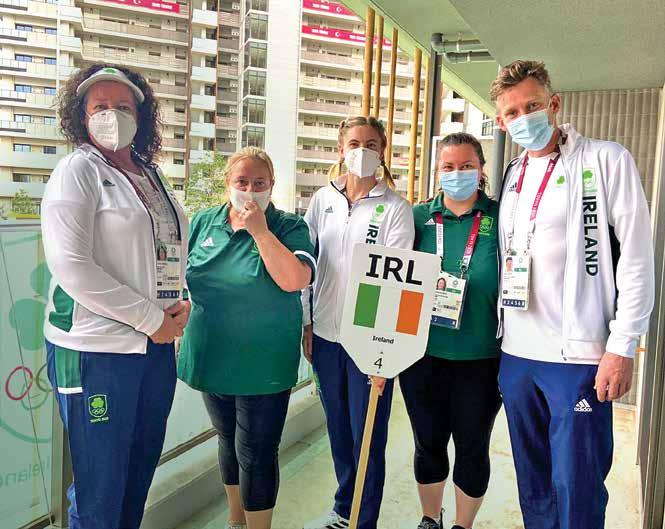
19 minute read
The WA Story Behind Ireland’s Olympic Glory
AS UNLIKELY AS IT MIGHT SOUND, TEAM IRELAND WAS LEAD INTO AND THROUGH THE TOKYO OLYMPICS BY A WEST AUSTRALIAN WITH AN OUTSTANDING SPORTS CAREER. ALBANY NATIVE PATRICIA HEBERLE WAS NAMED CHEF DE MISSION FOR THE IRISH NATIONAL TEAM IN 2018, AND WHILE THE RECENT END OF THE GAMES WILL SEE THAT ROLE WIND DOWN, HER RELATIONSHIP WITH THE OLYMPIC FEDERATION OF IRELAND AND THE COUNTRY ITSELF IS SET TO DEEPEN.
BY LLOYD GORMAN
Advertisement
Above: Grand Finale – From left, Chef de Mission (CdM) Patricia Heberle from Western Australia with Team Ireland staff Linda O’Reilly Operations Manager and Alex Bocsi Team Support Manager and Gavin Noble Deputy CdM get ready for the closing ceremony with Modern Pentathlon athlete Natalya Coyle who was the Irish flag bearer for the event. “A lot of people would say to me you’re an Australian, how did you get that job and sometimes you have to pinch yourself and say yeah, how did I?,” Patricia told Irish Scene in August during a much deserved and badly needed two week holiday. “Sometimes you are in the right place at the right time and maybe there was a little bit of fate involved, but it’s been a fantastic job to have and working in Irish sport is probably only second to working in Australian sport. There is incredible potential, a lot of excitement and a lot of motivated, passionate people and it’s been an honour to have had that role to take Team Ireland to the Olympics, a highlight of my career.”
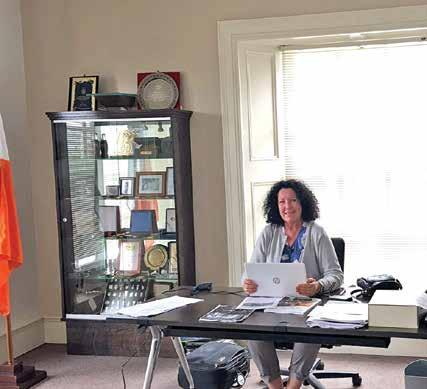
Right: WA native Patricia Herberle was appointed Chef de Mission for Team Ireland and walked with the team at the 2020 Tokyo opening ceremony (above)
With a professional background in hockey and high performance sport, she had just relocated to the UK in July 2016 when she was invited to do some consultancy work for Swim Ireland by the CEO Sarah Keane. In February 2017 Keane became the first female president of the Olympic Federation of Ireland. “She must have thought I did a good job because she asked if I would like to come and do some work with the Olympic Federation of Ireland.” It was a period of major change and renewal for the organisation. “So I came in to do some initial work to support them through that period of transition and to assist with some of the early planning for Tokyo, and I haven’t left. When the Chef de Mission role came up, I applied for it and I got the job. It was one of those situations where I was in the right place at the right time. If I reflect, I think they were quite open to having someone who had different ideas and who came from a different background because they were looking for that refreshment.” Her appointment as Chef de Mission was announced in December 2018 and as well as the Olympics Heberle was also in charge of Team Ireland for the 2019 European Games in Minsk. During this time while living in England she would travel each week to Dublin to work there. I put it to her that there is nothing more typical for a WA worker to be a FIFO (Fly-in Fly-out). “I know, it’s almost in my genes,” she laughed. After a successful European Games the Olympic Federation and key support staff focused their attentions on Tokyo. The dramatic onset of the COVID-19 pandemic in early 2020 and lockdowns in March stifled training and preparations for the big event and cast a dark shadow over the Games themselves. Like practically everyone else Patricia found herself working from home and having to find new and different ways to operate. “It’s an interesting fact that much of our planning was done with people in their home offices and at the kitchen table connecting through Zoom and other platforms,” she said. “It wasn’t really until April/May this year that we were able to work with people face to face again, but within very restricted protocols, with no more than six people in a room, 2m social distancing and all that, so not an ideal situation to be honestly.” As the crisis continued and deepened around the world it seemed increasingly likely the 2020 Summer Olympics – due to open on July 24 – were on a collision course with the virus. On March 24 2020 the International Olympic Committee (IOC) declared the games would still go ahead “no later than summer 2021”. Patricia clearly recalls the period when there was significant speculation, mixed messages and mounting pressure on the event from all sides. “So we weren’t necessarily surprised when they made the call, but speaking for myself only it was an interesting experience to live through. A few weeks passed before we knew the Games would be held one year
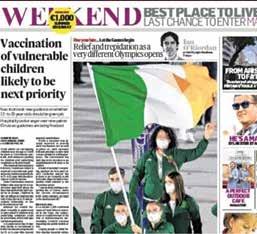
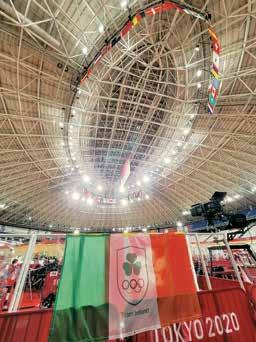
Above: Hockey Ireland signs MOU with Iwate delegates for pre-Games camp
Image: hockey.ie
later than planned, but it was a period when there was a lot of speculation being driven by the media and so it was a relief to have the decision made. Athletes who had spent years preparing for the Games suddenly felt like their life long dream was going to be taken away from them, while all the flights, accommodation and other arrangements made by the organisation were thrown into disarray. “We were well advanced in our planning in March so it was almost a grieving process and it was a couple of months before we all recalibrated because we were in phase 1 of the pandemic and in lockdown. We relied on emails and on-line meetings to connect with the athletes and staff as there was a lot of uncertainty at the time. With our office closing down, just like pretty much every other sporting business, including Sport Ireland we had a month or so where we were forced to stop and recalibrate before we moved forward in planning for 2021. One of the biggest things was that around 50% of our team had qualified, so the sports had some certainty around participating in the Games. But we had another group of seven or eight sports who were scheduled to attend Olympic qualification events, but most of those events had been postponed, cancelled or qualification requirements had been changed. So while there was a lot of responsibility on the Olympic Federation and my staff team around the logistics, Village operations because everything is completely aligned to how big a team we had, how many sports we had and the needs of those groups, there was still a lot of uncertainty. We had some sports and athletes who had qualified – such as Women’s Hockey, the Equestrian team, Rowing, Canoe Slalom, Cycling and Taekwondo – we were still guessing in respect of swimming, athletics – which was always going to be a big delegation – and a whole range of other sports that were trying to get to qualification. It was a highly stressful time for the whole Irish sport system and there was great uncertainty around access to training facilities, many of which had to close due to Covid and travel to overseas competition, so there was a lot of uncertainty for everyone”. To the relief of everyone involved the postponed Games eventually came to be and the first of two Team Ireland staff delegations arrived in Japan on July 5th to set up the Irish pre-Games training camp in Fukuroi City where around 9 sports were going to be based to train and acclimatise to the local conditions. “Then on July 8 the main staff group – including myself – arrived in Tokyo and we moved straight into the Olympic Village. Our role was to set up the village accommodation, our HQ office, our own independent Medical clinic, decorate all the rooms and prepare for the first lot of athletes to arrive. You are there from day one and it’s absolutely full on and every day is a long day.” On top of supporting 116 competing athletes and 10 reserves, there was a backroom team of about eighty officials including a dedicated Covid Liaison Officer, team managers, sport specific coaches, 5 doctors, physios and psychologists. All of these were charged with implementing the COVID guidelines and requirements for both Team Ireland, the International Olympic Committee and of the host country. Like everyone else participating in the Games, every member of Team Ireland had
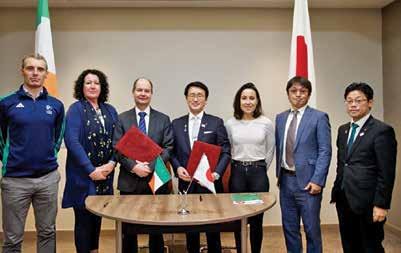
saliva testing carried out every day. “There were a lot of things you had to do which had nothing to do with sport but that had a lot to do with keeping people safe and healthy and that was a big responsibility. One of the things I am most proud of is that we did not have one positive test in Japan. We had a few people who were inconvenienced by named as close contacts on a couple of flights into Tokyo before the Games began, but there were a lot of countries that had positive tests in the Games and in the village and it was a relief that we wren toe of those. We had managed to get almost everyone vaccinated before we left Ireland and it was a very professional and disciplined group. Keeping people safe and healthy was probably one of the biggest pieces of work that myself and my team had to do to ensure that people could compete or fulfil their particular support role.” Patricia is no stranger to the Olympic arena. As a member of the Hockeyroos - Australia’s national women’s hockey team – she played in the 1984 Summer Olympics in Los Angeles and was a member of the coaching staff for both the 1996 and 2000 Summer Olympics in Atlanta and Sydney. She has also been involved in more World Cups, Commonwealth Games or Championships than you can count on two hands. She knew these Games would be unlike anything she – or her colleagues – had experienced before but she found the challenging environment actually brought the members of Team Ireland closer than might happen normally. She did everything she could to support the athletes and tried to get to as many events as possible, as much as to have an ‘Irish’ face cheering them on. “I probably got out to see sport on about ten occasions and we had big flat screen TV set
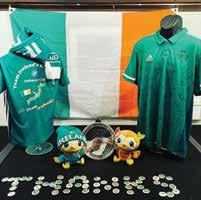

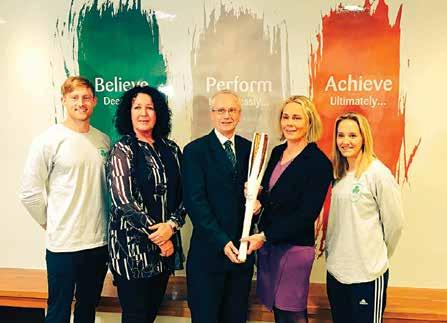
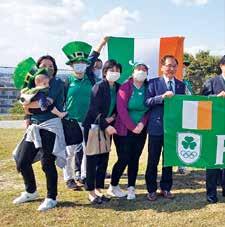
up in the office so anytime there were Irish athletes everything stopped and everyone watched those athletes or watched the Rugby 7s or Hockey teams. The build up to anyone performing is always exciting and before any of the medal racing or boxing bouts it was huge and then they actually win the gold medal and there’s a lot of celebration amongst the team. Whatever time the athletes arrived back in the Village we would assemble as many of the team as possible outside to create a socially distanced guard of honour for our medallists to walk through”. There were a lot of rules and requirements every day that were about keeping the Japanese community safe, about keeping the athletes safe, keeping the village safe and viable and allowing the competition to go on. Our group and particularly the athletes were very diligent and well organised and that meant that they weren’t hindered as I said by being close contacts or any of the group testing positive and allowed them to focus on their event and the competition. I think the thing that was really different for the athletes was there was no social context to the games, a lot of the socialising you would have with other countries and the ability to move freely around the village was reduced and also each group had a reduced period to stay at the Games so basically you could only arrive five or six days before you competed and then you had to leave one to two days after you finished the competition. That was very different, normally people would stay on to party, do sight sighting or shopping and none of that was really allowed. So it made for a more controlled and serious Games rather than the fun and light hearted moments you would traditionally have with some of the mixing between the countries and sports.” There was however at least one amusing and entertaining episode involving a Team Ireland member which went viral on social media and in news outlets around the world. While the Games were still in their early days for a few days audiences around the world were fed repeated sensationalised stories about the ‘anti-sex’ beds - made from cardboard – in the rooms of athletes and others in the Olympic village, designed apparently to stop the athletes from enjoying frisky romps. The much less ‘sexy’ truth was that it was a bid by the Japanese authorities to be environmentally friendly with the 18,000 beds able to be recycled into paper products after the event was over. A prime example of not letting the facts get in the way of a good story. Single handedly Irish gymnast Rhys McClenaghan was able to put the story to bed so to speak. In a 14 second long video clip he was able to disprove the theory by jumping up and down on one of the beds like it was a trampoline. “The beds are meant to be anti-sex, and yes they are made out of cardboard and apparently they are meant to break at any sudden movements, its fake news.” That clip got more than four million views (and counting) and even attracted a message from the official Olympic Twitter account: “Thanks for debunking the myth!”. Patricia said McClenaghan already had a large following but
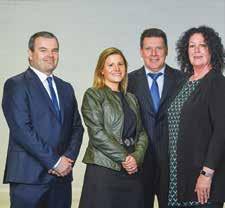
Opposite left: Heberle at her appointment as Chef de Mission in 2018. Left: Team Ireland Leadership Group – Liam Harbison, Deputy Chef de Mission; Nancy Chillingworth, Pre Games Training Camp Manager; Phil Moore, Head of Performance Support; Patricia Heberle; and Gavin Noble, Deputy Chef de Mission.
his post achieved maximum impact and was a nice distraction. “He created a light hearted moment that sent the media into a bit of frenzy on one particular angle and it did go viral all over the world,” she said. “I think he’s still getting attention from that, but people have to make their own fun and it was a nice way to start the games to have some attention on one of our Irish athletes.” She is proud of what she and her team were able to accomplish in Japan. “We came home with two gold medals and two bronze and in the previous Rio Games Ireland won a silver and bronze, so we doubled our medal count,” she said. “But I think outside of the medals, what was really significant was that we had more athletes getting into finals, we had a lot of Irish records broken and we had a lot of personal bests and season bests. This is really positive for Irish sport as the Olympics is such a tough competition and we are a small country and who can’t compete around the funding that some countries invest into high performance sport. So they did really well and to win Gold medals and Bronze medals in both rowing and in boxing, well we are pretty happy with that. You would always like more, but you have to be realistic and to be honest one of the most important things about these Games was that we could travel to Japan, safely compete and keep our athletes healthy and get them home. Trying to make the Games experience positive for the athletes was important, but we all knew it was going to be different from any previous Olympics, so as Chef de Mission I was just as pleased about having no positive tests, no breaches of the rules and managing to deal with a lot of real challenges, as I was to have had the four medals to bring back to Ireland.” The Olympics might be over and a new Chef de Mission (Gavin Noble) named for the Paris 2024 Games, but Patricia’s association with Ireland is only getting deeper. “I’m actually continuing in a different role with the Olympic Federation and then in early 2022 I’m moving to Ireland to live there, for the next three years. I’ll be house hunting from October and the prospect of living in Ireland is very exciting because it will allow me the chance to build on some of the relationships and friendships I’ve already developed and help to explore the country a bit more. Going from FIFO and being a visitor to being able to immerse myself fully in Irish culture and Irish life, that will be great.” During lockdown with more time on her hands than normal Patricia did some research into her family tree and discovered she had some Irish ancestry she wasn’t previously aware of. “My great grandfather on my father’s side was born in Ireland in 1865, he grew up in Manchester and emigrated to Australia with his family in 1877,” she said. There are big gaps in what she knows about him but she hopes to find out more in the coming years.” Her past encounters with the Irish have always been positive. “I played Hockey against Ireland a long time ago and I coached against Ireland with the England women’s hockey teams and I was on the Australian staff team for the World Cup in Dublin in 1994,” she said. “There’s always been an affinity with the country, I’ve always loved going to Ireland and we have always been very well hosted, people were friendly and we always had a good game, it didn’t matter if it was Australia ranked number 1 playing Ireland or England ranked 6 playing Ireland, it was
D.J. Gordon & Associates
(WA) Pty Ltd
ACCOUNTANTS & TAX AGENTS
SERVICES INCLUDE:
• Income Tax Returns • Business & Instalment
Activity Statements • Preparation & lodgement of objections to ATO assessments • GST and ABN registrations • Company Secretarial services • Bookkeeping Myles Gordon
LLB, FIPA
987 Wellington Street, West Perth WA 6005 Correspondence to: PO Box 480, West Perth WA 6872 E: djgordon@djgordon.net.au T: 08 9321 2266
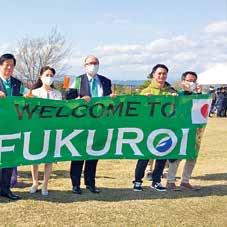
Right: A tweet from Irish insurance company FBD Insurance: “What an amazing couple of weeks in Tokyo. Congrats to all @TeamIreland athletes who represented Ireland with such distinction on the world stage. A special shout out to our ambassador @kelly64kg as she returns home this week with Gold. #SoundSupport #TeamIreland ”
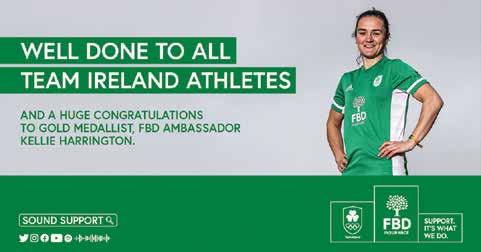
always a tough encounter. I’ve been lucky enough through sport to travel all around the world but there are places you go that you just feel really comfortable and Ireland is one of those places. I think the Irish and Australians in particular, we’ve got certain attitudes to life that we share. The Irish can have a good laugh and like to have a drink and are really good fun socially, I’d like to think Australians are pretty similar. While she has always felt a connection with Ireland Patricia is fiercely proud of being an Australian and her upbringing in WA. “I come from Albany, down the coast from Perth,” she said. “When I was growing up in Albany the population was about 10,000 people and my father was a professional fisherman, so I come from pretty humble country beginnings. But I always had ambition and my first dream was that I would go to an Olympic Games and compete in hockey. That motivated me all through my teens and as I progressed and made a few State representative teams I also got a real bug around travel and developed a sense of confidence and set goals and knew that if I put my mind to it and I worked hard I could achieve things. That has really been the foundation for finding myself in a place like Ireland, that I’m not scared to step outside my comfort zone and I’m not scared to take on challenges and I think that attitude and mindset has been shaped by my family, living in the country and life and sport experiences from a young age. I had a rich sporting life in Albany and as kids in country towns often do I played lots of different sports, but I started my hockey and I learned my hockey in Albany and I will never forget that. The other thing is I come from a family background that kept me humble and that helps to ensure that you don’t take yourself too seriously and you’ve got people around you who know what’s important in life, and maybe that’s not always yourself or sport. So sport is great and sport can take you different places but there are a lot of other things in life and coming from a small country town where people work hard and just get on with things, you learn to take the good with the bad. A lot of people say to me did you feel disadvantaged growing up in the country and that you must have missed a lot of things and opportunities that you would have in the city, but no the opposite. I’m grateful I grew up in a beautiful part of WA and Albany is such a brilliant town that gave me a lot of my first opportunities to grow as a person and certainly in sport.” During the normal course of things Patricia would travel twice a year to see family and friends at home, but her last trip home was at the end of 2019. “Whenever I get back one of the first things I want to do is get down to Albany and then get out to a special place an hour out of Bremer Bay where we have a family beach shack. Those are the first things I want to do and when I get the opportunity to go home I’ll take it. I’ve contemplated that I might be able to get home for Christmas but with each week that passes it seems that’s not going to be possible and obviously with your borders still in lock down and quotas on how many people are being let in, I’ve decided I’ll have a go at maybe getting back for Easter 2022. I’m fully vaccinated and I’m hoping by 2022 borders may reopen and it’ll be easier to come back to Perth. It’s still such a volatile situation across the world and in Australia. I don’t know when I’ll get back, but I’ve got my fingers and toes crossed.” ☘










